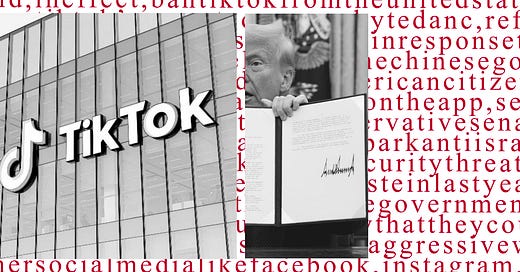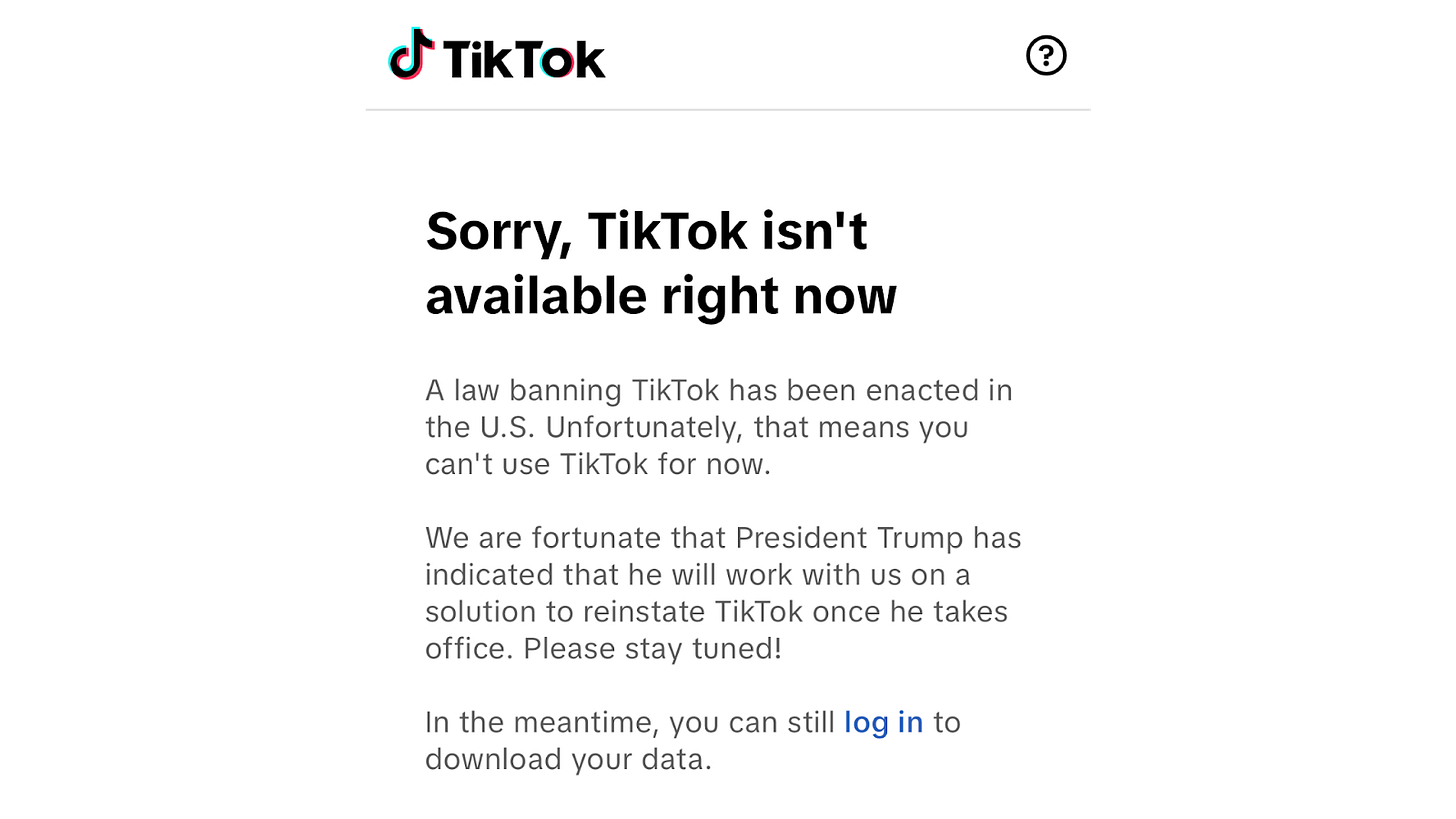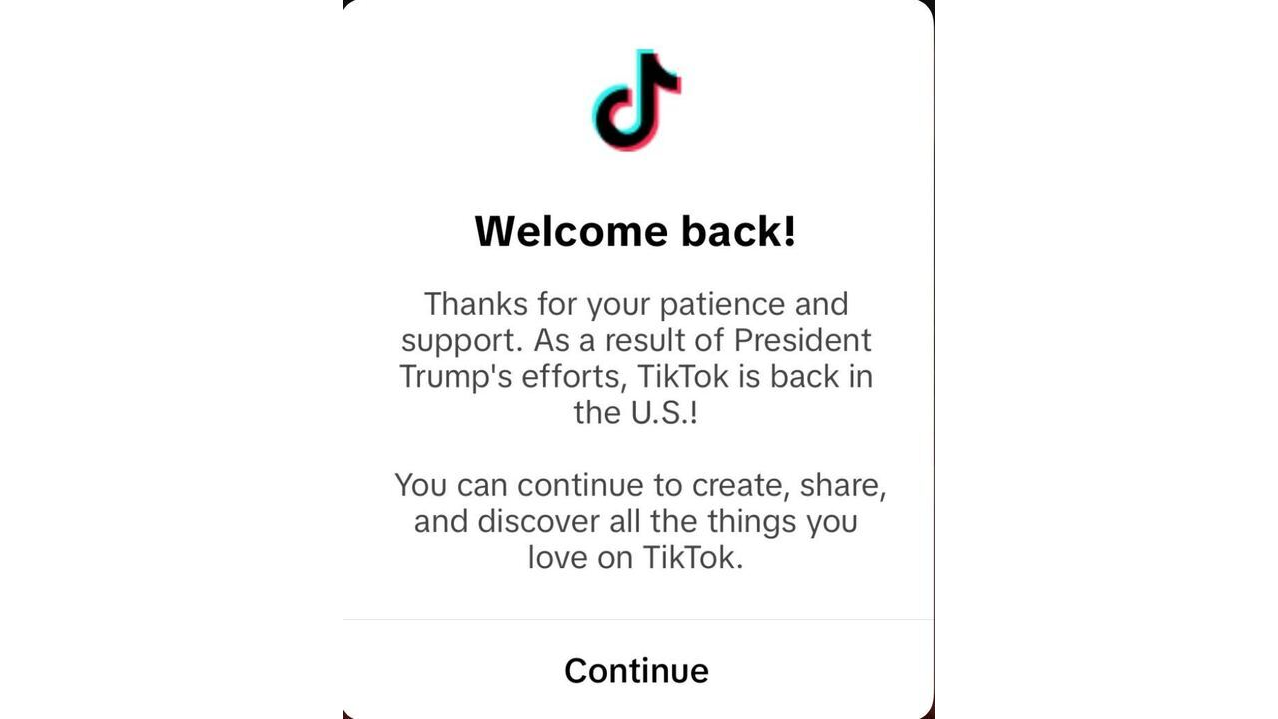The TikTok Ban Political Pawn
Why is the US Government trying to ban the popular social media app TikTok?
On March 7th, 2024, Congress passed H.R. 7521, a bill called the “Protecting Americans from Foreign Adversary Controlled Applications Act,” with a bipartisan vote of 352 to 65. Politicians on both sides of the aisle rallied for this legislation, which would, in effect, ban TikTok in the United States if it was not sold to an American firm. TikTok’s parent company, ByteDance, refused to sell and attempted to fight the ban in court.
This issue began in response to the FBI warning of social media app TikTok’s alleged relation to the Chinese government and their alleged ability to gain access to the data of American citizens. Some prominent politicians like Mitt Romney cited the amount of pro-Palestinian content on the app as grounds for a ban, seeking to hide videojournalism coming out of the Gaza. Conservative senators cried that the app was being used to spread propaganda and spark anti-Israel sentiment on college campuses. The evidence that TikTok is a security threat is flimsy at best. An article by independent journalist Ken Klippenstein last year describes how the FBI hasn’t presented any proof that the Chinese government has taken any measures to collect data from American users, only that they could if they wanted to. There was also no proof that TikTok is any more aggressive with collecting user data than any other social media like Facebook, Instagram, YouTube, or Twitter, suggesting the only reason for targeting this app, in particular, is that it is under the jurisdiction of Beijing, not the US. At worst, this is a blatant attempt to further curb the free speech of Americans by bringing a massive social media platform under US control and thus subject to any censorship administered by the State Department. A letter drafted by the ACLU urged lawmakers to oppose the legislation as it violates free-speech principles and civil liberties, preventing Americans from organizing online.
In 2020, during his prior term, President Trump considered banning the app because his administration believed it was a national security threat. Congressional support for a ban grew throughout former President Biden’s term, mainly on the Republican side of the aisle from Marco Rubio, Mike Gallagher, and Josh Hawley. Biden passed a law in late 2022 that prevented government employees from having TikTok on their devices after efforts were made to crack down on foreign influence on social media.
On April 24th, 2024, Biden would sign the H.R. 7521 bill into law. TikTok would then sue, beginning a court battle which the DC Circuit Court of Appeals unanimously rejected. The case was appealed and taken by the Supreme Court in TikTok v. Garland, which combined with Firebaugh v. Garland brought by content creators on the platform. The case was decided expeditiously and released officially on January 17th, 2025, in a unanimous 0 to 9 decision that the law was being upheld. In the decision, the justices essentially disregarded the law’s effect, being that a massive social media platform for free expression would be banned. They also disregarded the obvious motive behind the law, to sell TikTok to a private American firm and to censor pro-Palestinian content. The primary thing focused on in the decision was the justification for the law, which was to address the alleged national security risk of the Chinese government.
So far, no substantial evidence has come forward to support the claim that China’s government was meddling with the app. In 2023, there was testimony from a former employee who claimed the Chinese government accessed user data but provided no material evidence. In December of 2024, the DC Circuit Court of Appeals admitted, regarding the case for H.R. 7521, that the US government “lacks specific intelligence that shows the PRC has in the past or is now coercing TikTok into manipulating content in the United States.” Writing for the CSIS, intelligence expert James A. Lewis suggests that the legislation is disproportionate to the minimal threat posed and possible damage caused by Chinese meddling and recommends passing a national privacy law.
The language in the law could also be used to ban or influence any Chinese-based app or website that the White House wants. Major Chinese-owned platforms operating in the US include AliExpress, Temu, CapCut, and SHEIN. Tencent, which owns stakes in the video game studios behind Fortnite, Valorant, Clash of Clans, League of Legends, and many mobile games, could also be affected.
After the court decision, the ban was set to take effect at midnight on January 19th, 2025, setting off a panic in the app as creators and users scrambled to prepare for it going offline. Creators focused on reorienting their communities to another social media platform until the ban was lifted or for a permanent refuge. Users concerned with saving content downloaded videos and looked for ways to circumvent the ban with a VPN service. Ironically, the community largely agreed to migrate to the Chinese app called Xiaohongshu or RedNote, pushing it to #1 in the app store on January 14th, where it has stayed for 9 days. RedNote is an alternative app to Instagram used in China since all American internet-based companies are banned. The app has over 300 million users monthly, the majority of whom are in China, compared to TikTok’s 1.7 billion monthly users worldwide, including 170 million monthly users in the United States.
Inevitably, the ban went into effect on schedule, prompting American users with a message stating that the app could not operate in the US and that Trump, who was not yet in office, was working to find a solution.
That solution came just 12 hours later, on January 19th, when a new message said that TikTok and incoming President Trump reached an agreement to restore the app, as he would be inaugurated the following day.
The afternoon after his inauguration on January 20th, President Trump issued an executive order to halt the enforcement of the legislation for another 75 days. During the press session, Trump stated that he changed his mind about the app suggesting that a deal should be made instead where an American company gets half of TikTok. It’s critical to note that the app is currently unavailable in app stores as Apple and Google face enormous fines if they host it, but it can still function on existing devices. The only way the app would be restored is if Congress passed a new law reversing the effects of the old one or if the sale of TikTok to an American firm went through because the executive order only delays enforcement.
What happened here was that the United States government was trying to exert its might to capture power from a foreign nation and, ultimately, its own people. This effort is popular among Congresspeople since they all have different reasons; the AIPAC members want to silence any speech sympathetic to Palestinians, big-tech-backed members want to benefit corporations, some opposed it for being ‘harmful to children,’ and many bought into the idea that the US should have a hostile relationship with China to support Taiwan.
All of this was all a bluff. The situation quickly unraveled as the US government, as powerful as it is, still doesn’t have the might to push around a massive social media company, especially one that half of Americans use. Lawmakers underestimated that TikTok was not willing to sell that easily. They likely believed they could apply the same pressure of forced divestment that they did to other companies in the past. In 2019, the US government forced the dating app Grindr to divest from China, ultimately being sold in 2020. TikTok, however, has 1.9 billion users globally, so a threat to lose 170 million users would be damaging, but it wouldn’t be existential. That’s why owner Zhang Yiming communicated with the Trump administration, seeking a deal or agreement, not a total capitulation.
The new Trump administration will likely kick this proverbial can down the road, getting Congress to pass a new law overturning the ban so everyone forgets about it. If nothing happens, the ban will go back into effect on April 5th when Trump’s executive order pause expires. It will be a lose-lose for both TikTok and the US since it seems Trump is only in it to gift investment to an American tech company and claim hero status for ‘saving TikTok.’
A large part of this event is the Democrats habitually failing strategically. Over the past decade, there was so much concern about foreign nations meddling with social media to influence American elections, some of which was valid, but much of which was inevitable and inconsequential. The TikTok ban effort was rather perplexing since Trump was the original actor who was worried about the app, so why continue his pursuit during the Biden administration? Part of this has to do with covering up the genocide in Palestine which was slowly dividing the younger base of the party, and partly that the TikTok platform is structured to feed users original content made by average people rather than corporate media. The most baffling aspect of this is Democrats risking alienating a group of people who are both primarily young and more likely to be Democrats on a platform with content that leans liberal. The failure was compounded by the fact that American social media CEOs Musk and Zuckerberg swung all the way right to enthusiastically support Trump. The ban’s timing also created a dire problem once Trump won, as he was positioned to use it as a political chess piece immediately. This event was unquestionably big news that the public would know about, perfect for Trump to exploit– and that’s exactly what happened. In the last days of the Biden administration, he frustratingly did not pause the ban outlined in the law’s text, which Trump took full advantage of, shining the spotlight on himself. It’s not like this came out of the blue either; this was in the news for at least a week before the ban went into effect, as users were already migrating to Xiaohongshu. There’s no excuse for Democrats fumbling this.
The story of this dilemma is one of capitalist interests and the state fighting to control the means of communication. Despite this legislation being fairly unpopular among the public, both political parties are working together to please American corporate interests. It’s a win-win for corporations; TikTok can get sold to an existing US company or go public on Wall Street, benefiting investors directly. If banned, most of the existing TikTok traffic will go to alternative apps, primarily benefiting Meta, Google, and Twitter. The state also has the interest of sowing dissent and suppressing dissent as it pleases. The internet puts us in a unique time in history when Americans can instantly see what is happening around the globe, which threatens America’s image as the benevolent peacekeeper in a post-Cold War age. On apps like TikTok that are not affected by State Department censorship, people can see firsthand the effects of American oppressive hegemony across the globe. As the internet is structured, it’s made to be decentralized and function free of censorship, but that doesn’t mean the state doesn’t try to control, privatize, and censor the information stream. A rule to remember is that if the state isn’t suppressing something, it isn’t posing a threat to it. If it is being suppressed, it is a threat. As the American state loses its grip on power domestically and abroad, it will have no choice but to suppress speech and erode our means of communication. This is just the beginning.








I agree
“ As the American state loses its grip on power domestically and abroad, it will have no choice but to suppress speech and erode our means of communication. This is just the beginning.” Wow. Great line